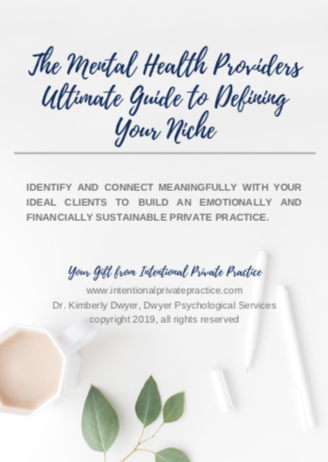Service. To give of yourself for the benefit of another. When I talk to mental health providers and affiliated helpers and healers, service is often very high on their list of values. And for good reason–we are expertly poised to give of ourselves: our time, our knowledge, our expertise, our skills, our listening ears. As small business owners, private practice providers also have a value of financial stability. And combining the values of service and financial stability can create some internal strife, but it doesn’t have to.
Just like our clients may have an un-helpful internal narrative, we providers can also carry stories about our work, laden with societal expectations and judgments about the relative merit of competing values. Ever hear a colleague remark that “we didn’t go into this for the money?”
I’ve had a former supervisor terrify me with stories of how little I would get paid after receiving my doctoral degree… to be honest, I spent the majority of my grad school years in a state of almost constant anxiety about how I would ever pay back my student loans given the prospects for my future salary and seemingly competing desires of starting a family and owning a home.
Here’s the thing: being of service does not mean giving away your work for free. Yep, I said it. Go back and re-read that sentence if you need to so that it really sinks in.
Let’s look at this first from the bottom up. What does it take for you to be in business? To keep your doors open? There’s all your typical business expenses–rent, overhead, insurance, utilities, CE trainings, licensure expenses, etc. Then there’s you. Consider yourself an employee of your business and think about what you need to pay yourself for YOU to be interested in working in your business. You may have professional debt to pay off, but even if you don’t, consider the investment in your career that your graduate degree–and time out of the workforce to earn that degree–cost you. That needs to be paid back. If you wouldn’t go work for yourself based on what you’re paying yourself, then maybe you need to rethink how you are balancing values of service and financial stability.
Also consider what it means to serve. Serving others does not necessarily mean you should work with them at any and all costs. Serving others, to me, means you use your knowledge to help create a good fit between client needs and provider expertise and availability. If your costs are too much for a client to afford for more than a few appointments, then it most likely does not serve them to see them for those few appointments and then terminate services.
And it may not serve you to drop your fees in order to retain them as a client. If you engage in practices like this frequently and without first assessing what is practical for you as a business owner, your employee (aka, YOU) will burn out, and quit (aka, go out of business). That leaves you serving, well, no one. And likely not feeling really great either.
Examining your values around service and financial stability and aligning these prior to making decisions about your business policies, and not about a particular client, may move you into a space of being able to serve while holding a financial boundary. For instance, you can serve by hearing a prospective clients needs and referring them to local services that may be a better fit, clinically and/or financially for their situation.
Want to get super clear on your ideal client and your niche, with a heavy focus on how this is informed by your values? Download my free guide, The MH Provider’s Ultimate Guide to Defining Your Niche. Once you’ve worked through this, get in on the conversation on my FB Group, Intentional Private Practice–Community. See you there!





